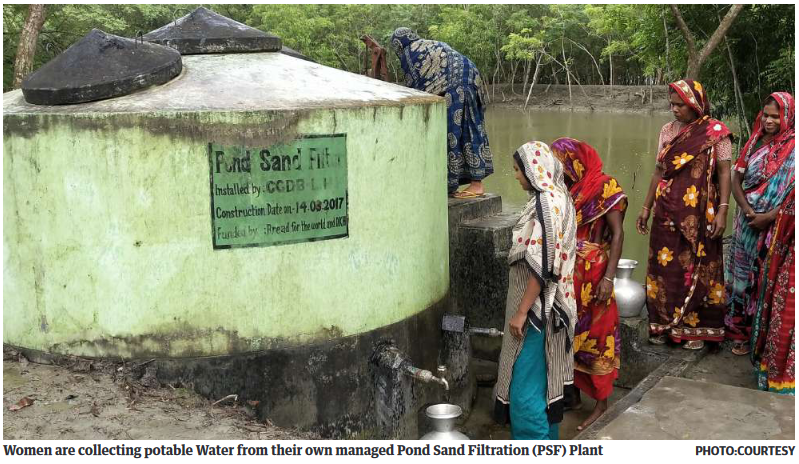Women-led community water governance
- Author(s): Palash Sarker & Jesmin Akhter

WOMEN-LED INITIATIVES
Mollahpara, a living place of approx. Three hundred families of Vamia village under Shyamnagar upazila of Satkhira district. The story of the sufferings of acute potable water is not different compared to other coastal towns of Bangladesh. But how they manage the problem compels us to turn back the flashlight to them. The women of this place have come forward and taken the leadership role in solving the drinking water problem by themselves.
Climate change induces coastal salinity intrusion into the freshwater, for which 20 million coastal people are suffering from the crisis of safe drinking water in the coastal area of Bangladesh. Though water is an essential requirement of human life and livelihoods, access to safe drinking water is minimal for the people of these areas, which becomes extreme during the dry season. The rising sea level is one of the significant causes of salinity intrusion into freshwater aquifers. Natural disasters like cyclones, tidal surges, river bank erosion, and flood are very frequent in Bangladesh and pollute the freshwater with salinity and create an acute drinking water crisis. Initiatives have been taken widely by the government and non-government agencies to reduce the scarcity of drinking water by installing different adaptive measures such as Pond Sand Filtration (PSF), Community-Based Rainwater Harvesting, and Water Desalination Plants. But the mechanism for equitable utilisation and sustainable management by the community people was not in place, which failed to reduce the people’s suffering for a more extended period. It is essential to create access for vulnerable people to drinking water by different adaptive measures, and similarly significant to make it effective significantly for a more extended period.
Christian Commission for Development in Bangladesh (CCDB) focuses on reducing the climate risk, especially for women and children, due to climate change impacts. The approach is to “Bring Women in Action” to reduce the potable water crisis and to establish a local-led management system at the community and household levels. CCDB facilitates women to raise their voices, initiate solutions and finally get them involved in management practices to solve problems.
“This women’s participation and leadership role is bringing positive social changes at the community level”
Traditionally in Bangladesh’s rural areas, women are the main ones responsible for collecting and managing water for the daily fulfilment of the families. The women of the Mollapara was seeking a suitable and sustainable source of potable water. Considering the crisis of almost 250 families, CCDB extended the support by installing a Pond Sand Filtering system at Mollapara of Vamia village in 2017 to fetch water from walking distance. Prioritising sustainable community management rather than creating some short-term solutions, CCDB mobilised the women of Mollapara
and formed a Management Committee to transfer the role for the sustainability of the efforts. The 30-member Women-led Management Committee established a
community water governance system in a participatory way where approx. Two hundred vulnerable families are getting access equally to reduce the potable water crisis. They developed a guideline on water distribution and transparently collected a minimum monthly fee for the maintenance of the PSF throughout the year. From 2017 to 2023, the continuous six years of successful management portray the effectiveness of women’s leadership. The excitement blooms in Sufia’s words, the leader of the group, “We, the women, were always treated as water collectors, now people used to call us the water manager”. The treasurer Taslima Begham described how they ensure transparency through monthly meetings and use the additional money for women’s welfare. The community fund, skill, and local management have been established through this initiative to serve women for a long time.
“Women play a central part in the provision, management, and safeguarding of water” was agreed in the United Nations Conference on Environment and Development in 1992. As women are closer to water resources, they mostly take responsibility for collecting water. So, Women have appropriate knowledge about the use and management system of water resources. CCDB’s ‘Bring people in action’ of this strategy gives room to the ‘Bring women in action’ to create equitable water access for people of the coastal community in Bangladesh. This women’s participation and leadership role brings positive social changes at the community level. It reduces the water conflict among community groups, provides safe drinking water, helps to decrease waterborne diseases, and uses natural sources (rainwater) properly. This women-led community water governance system can make the PSF technology a successful adaptation practice and be replicated by other
communities and development partners.
- Source Website: file:///C:/Users/sanzida/Downloads/CT_March-2023_compressed.pdf
- Highlight of the_news: Women, Water

